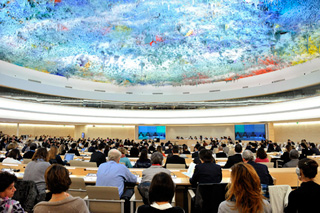Human Rights Council
| Human Rights Council | Topic | Member states | Links and documents | Contact |
|---|
HUMAN RIGHTS COUNCIL

The Human Rights Council is a standing body and the subsidiary body of the General Assembly. It was established by the GA resolution 60/251, from March 18, 2006. The Council is serving as the main United Nations forum for dialogue and cooperation on human rights. Its focus is to help member states meet their human rights obligations through dialogue, capacity building and technical assistance. It is also making recommendations to the General Assembly for further development of international law in the field of human rights. The Human Rights Council's headquarters are in Geneva.
Number and the election of the members of the HRC
The new Council consists of 47 members. Membership to the Council is open to all Member States of the United Nations. Members are elected by the General Assembly through individual and direct voting by absolute majority (96 votes). The distribution of seats is in accordance with equitable geographical representation of all members (13 from the African Group; 13 from the Asian Group; 6 from the Eastern European Group; 8 from the Latin American and Caribbean Group; and 7 from the Western European and Other States Group). When voting for members of the Council, member states are taking into consideration candidates' contribution to the promotion and protection of human rights. Members are elected for three year terms.
Sessions of the HRC
The Council does not hold fewer than three sessions per year (including the main session) for a total period of no less than ten weeks. It is also able to convene to deal with urgent situations, and to hold special sessions when necessary through a request by a Member of the Council with the support of one-third of the membership of the Council.
Non-members of the HRC
Observers, including non-governmental organizations, intergovernmental organizations, national human rights institutions and specialized agencies, are participating in the Council through the same arrangements and practices that apply to the Commission.
Human Rights Council and the Commission on Human Rights
Unlike its predecessor, in which members were elected by regional groups with the support of 28 or fewer countries, the new Council requires the agreement of 96 nations in a secret ballot. The 47-seat Human Rights Council replaces the former 53-member Commission on Human Rights. The Commission was an independent body, but the Council has been elevated to the status of a subsidiary body of the Assembly. "Special procedures" is the name given to the mechanisms established by the former United Nations Commission on Human Rights and continued by the Human Rights Council to monitor human rights violations in specific countries or specific global human rights issues.
